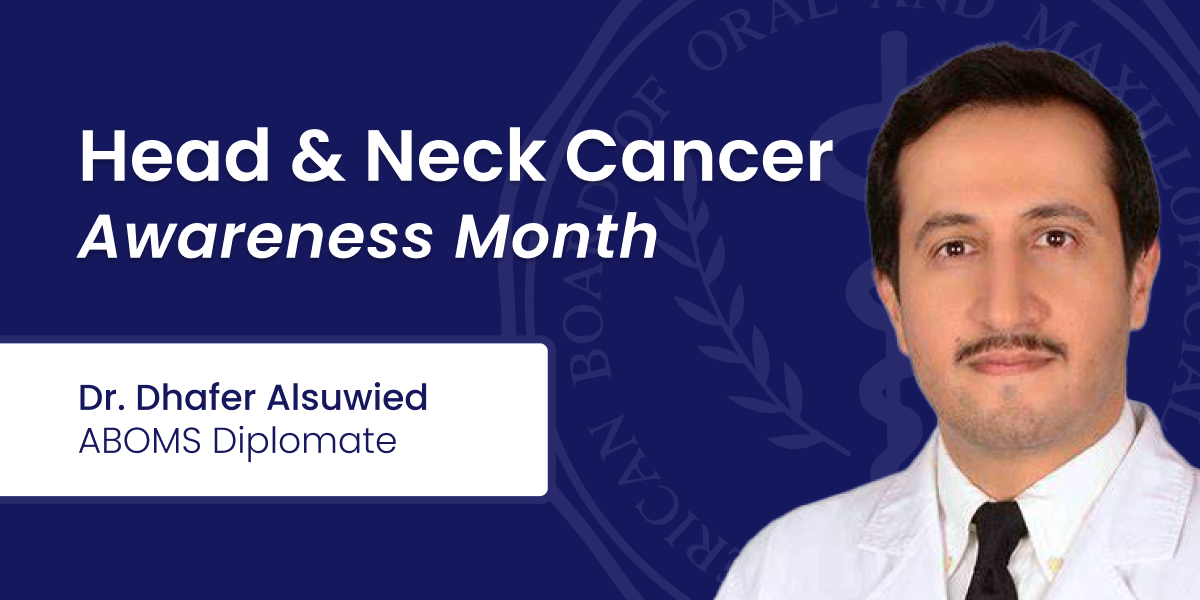
Apr 26, 2024 | admin
Meet Dhafer Alsuwied, DDS, a Board-Certified Oral and Maxillofacial Surgeons who holds an additional Certificate of Added Qualifications in Head and Neck Oncologic and Reconstructive Surgery.
How did you become passionate about head and neck oncologic surgery?
I became passionate about head and neck oncologic surgery during my first year after school. I was confronted with numerous cases of oral cancer that lacked adequate assistance and management in the area where I began my practice. Witnessing the dire need for treatment and the profound impact surgery could have on patients' lives ignited my interest further. Throughout my residency, I saw firsthand how these surgeries could provide hope to patients and potentially lead to their cure, which solidified my dedication to this challenging yet rewarding field.
What percentage of your practice today is oncologic?
Almost 85-90%.
What makes your work rewarding?
What makes my work truly rewarding, especially in cases of oral cancer, is that these patients don't come to me by choice; their need for help is urgent. They place their hope in me as a referral, trusting that I can aid them in their battle against these diseases.
The most fulfilling moments come when I can relieve them of pain, deliver the news that we've successfully removed the tumor, and reconstruct their mouth, jaws and face to a level where they can enjoy a good quality of life once again.
But the ultimate reward is when I can tell them that, after five years, they are cured from cancer. Knowing that I've played a role in that journey is what drives me every day.
“By educating patients about oral cancer and its signs, we can provide timely help and offer reassurance about the latest advances in reconstructive surgery, which can restore their quality of life almost to normal.”
How has this line of work affected you personally?
This line of work has had a profound impact on me personally in various ways. Firstly, through my training, I was prepared to take on the responsibility of managing such cases and providing help to those in need. The extensive training during my residency and fellowship empowered me to confidently stand by my patients and assist them in their fight against this disease. It has strengthened me, allowing me to acknowledge the gravity of the situation while also providing reassurance that there is hope through treatment and reconstruction.
In my personal life, I've become more caring, forward-thinking, and appreciative of each day. This experience has taught me the value of empathy, resilience, and gratitude.
What advancements in the field have you witnessed in your career, and what do you foresee in the future?
I see a very bright future in the field of head and neck cancer management and reconstruction. The advancements and updates in technology provide hope for effectively managing and assisting our patients diagnosed with head and neck cancer. Reconstruction techniques are also evolving, thanks to technology, allowing us to help patients who undergo extensive surgeries without the need for additional procedures in the future. With these advancements, patients can return to their normal lives and social interactions without major issues, which is incredibly promising.
Do you have any advice for patients, or aspiring oral surgeons, based on your experience?
My advice to both patients and colleagues is to always hold onto hope and think innovatively. With promising options emerging and advancements in cancer management and reconstruction, there are numerous ways to help patients facing these challenges. It's essential to screen patients for oral cancer regularly, and I've initiated a program at my practice where we offer free screenings every April. By educating patients about oral cancer and its signs, we can provide timely help and offer reassurance about the latest advances in reconstructive surgery, which can restore their quality of life almost to normal.
About Dhafer Alsuwied, DDS: Dr. Alsuwied’s journey began with an internship in Oral and Maxillofacial Surgery, followed by residency training at Jackson Memorial Hospital, University of Miami. Over the years of residency, his passion for Head and Neck Oncology and microvascular reconstruction grew. This led him to pursue a two-year fellowship at the University of Texas Health Centers in Houston.
Now, he practices the full scope of Oral and Maxillofacial Surgery, including Head and Neck Oncology and microvascular reconstruction, at King Faisal Specialist Hospital and Research Center in Saudi Arabia, where he established and serves as Director of a residency training program and has introduced advanced technology for reconstructive surgery, particularly in addressing defects in the head and neck region. He is also Adjunct Assistant Professor at Alfaisal University.
April is Head and Neck Cancer Awareness Month. In recognition of this important time for raising awareness about these cancers, we are sharing interviews with several of our surgeons. Find others on our blog »